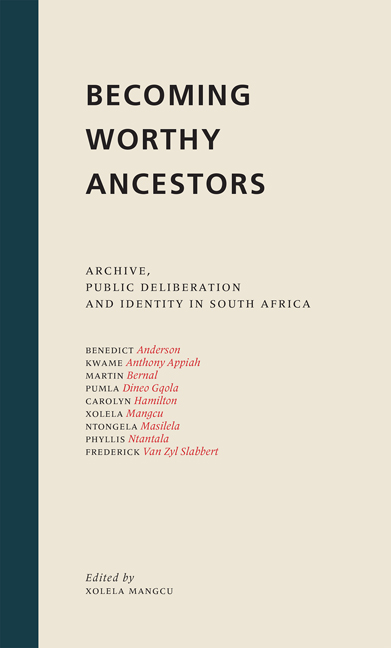Book contents
- Frontmatter
- Contents
- Preface
- Chapter One Evidentiary Genocide: Intersections of Race, Power and the Archive
- Chapter Two The Transmission Lines of the New African Movement
- Chapter Three Some Do Contest the Assertion That I Am An African
- Chapter Four Africa in Europe, Egypt in Greece
- Chapter Five Unconquered and Insubordinate: Embracing Black Feminist Intellectual Activist Legacies
- Chapter Six Identity, Politics and the Archive
- Chapter Seven The Goodness of Nations
- Chapter Eight Why Archive Matters: Archive, Public Deliberation and Citizenship
- Endnotes
- Index
Chapter Four - Africa in Europe, Egypt in Greece
Published online by Cambridge University Press: 21 March 2018
- Frontmatter
- Contents
- Preface
- Chapter One Evidentiary Genocide: Intersections of Race, Power and the Archive
- Chapter Two The Transmission Lines of the New African Movement
- Chapter Three Some Do Contest the Assertion That I Am An African
- Chapter Four Africa in Europe, Egypt in Greece
- Chapter Five Unconquered and Insubordinate: Embracing Black Feminist Intellectual Activist Legacies
- Chapter Six Identity, Politics and the Archive
- Chapter Seven The Goodness of Nations
- Chapter Eight Why Archive Matters: Archive, Public Deliberation and Citizenship
- Endnotes
- Index
Summary
In both imagination and reality, Ancient Greece is central to European identity. Since the early nineteenth century, northern Europeans have projected onto the Ancient Greeks all that they like to think good about themselves. They see Greece as the source of poetry, art, philosophy, science, freedom and democracy. They also see its culture as essentially having created itself, through what is called ‘the Greek Miracle’. This is seen to have led directly and inexorably to the triumphs of modern ‘Western Civilisation’.
By contrast, Ancient Egypt is portrayed as ‘exotic’ or ‘other,’ a rich and fascinating culture but essentially sterile and having contributed little or nothing to the mainstream of world history. In my series with the general title Black Athena1 I have argued that both of these images are flawed. Far from being essentially European, Ancient Greece was not pure but thoroughly hybrid, and its undoubted creativity came precisely from that hybridity. Furthermore, the main outside influences on Greece, and those that introduced urban civilisation to the Aegean, came from Egypt and Syro-Palestine.
Opponents of Afrocentrism argue that Egypt was not really part of Africa and stress the fact that it lies on the continent's north east corner. They do not note that the same argument could be used to detach Greece from the rest of Europe because of its peripheral position on the continent.
The Africanity of Egypt can be set out in a number of ways. The first and most obvious is that Egypt is geographically part of the African continent. Furthermore, Egypt has always been connected to central and eastern Africa by the Nile. In this it is unlike, for example, the Maghreb in north west Africa, which for the last four thousand years has been largely – though not entirely – cut off from the rest of the continent by the Sahara.
The second factor is physiognomy. There is a greater physical diversity among humans in Africa than in the rest of the world, for the simple reason that modern people, homo sapiens sapiens, have lived here twice as long as elsewhere and diversity develops with time. We know from their remains that, as with modern Egyptians, Ancient Egyptians were very varied both in their facial physiognomy and pigmentation.
- Type
- Chapter
- Information
- Becoming Worthy AncestorsArchive, Public Deliberation and Identity in South Africa, pp. 59 - 66Publisher: Wits University PressPrint publication year: 2011



